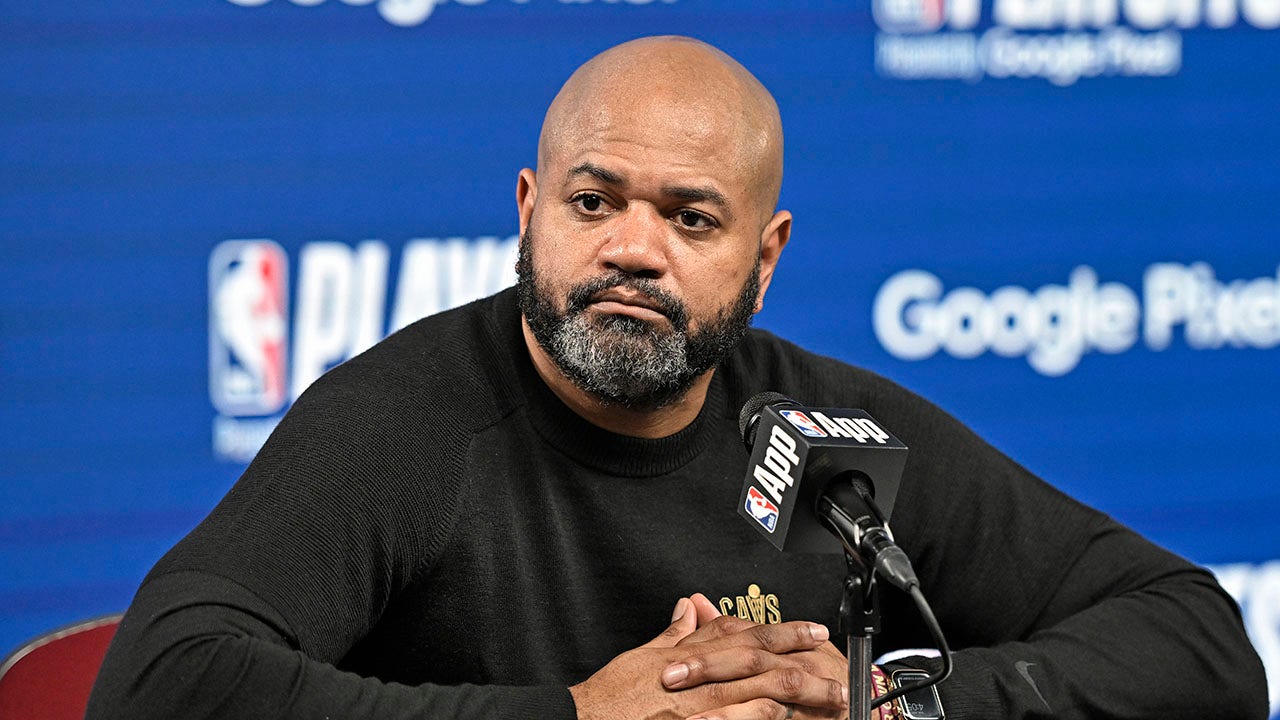Health
How DeSantis Is Trying to Lure Older Voters Away From Trump

As a 44-year-old member of Generation X, Gov. Ron DeSantis of Florida might be an unlikely candidate to wrest his party’s older voters away from Donald J. Trump, a 76-year-old baby boomer.
But he is trying anyway.
As Mr. DeSantis closes in on the official rollout of a 2024 campaign for president, he is seeking to make early inroads with this large, politically influential group of voters, and doing so by appealing to their pocketbook concerns.
He has focused especially on his efforts to lower prescription drug costs in Florida, including pushing the federal government for permission to import cheaper drugs from Canada. This month, he signed a bill that he says will bring down costs by regulating drug industry middlemen.
“We think that health care is too expensive,” Mr. DeSantis said as he signed the bill in Palm Beach County. “Prescription drugs are too expensive.”
“In our health care system,” he went on, “you see a lot of bureaucracy, red tape. And people are making money off this system that aren’t really providing value to the system.”
As he travels the nation appearing at Republican fund-raisers, the governor has added a line about the new law to his stump speech.
The attempts to highlight drug costs come as Mr. Trump, who would be Mr. DeSantis’s main Republican rival, has attacked him for having supported plans to restructure Social Security and Medicare — programs that are sacrosanct to many older Americans. (Mr. Trump himself has expressed similar sentiments in the past.)
More than 60 percent of Republican and Republican-leaning voters are over 50 years old, according to the Pew Research Center. Older voters also powered DeSantis’s overwhelming re-election victory last year. He won 6 in 10 votes from those over 65, according to exit polling.
The issue of prescription drugs, the prices of which have surged in recent years, reflects one of Mr. DeSantis’s advantages in a primary: the ability to promote a lengthy list of laws he has signed this year.
But talking about drug costs also illustrates the potential messaging challenges that Mr. DeSantis could face as a candidate. The governor, who considers himself a policy expert, has sometimes struggled when trying to make the topic tangible for voters. Drug costs are far drier and more complicated than the red meat he has fed to his base on conservative causes like defunding diversity programs at state schools, banning gender-transition care for minors and restricting the ability of undocumented immigrants to find work and gain access to social services.
And because he is signing so many new bills — including 37 in a single day — even some attentive Floridians are unaware of his latest attempt to bring down drug costs with legislation that regulates industry go-betweens called pharmacy benefit managers.
Al Salvi, 61, is the kind of voter who would seem likely to know about the new law. Mr. Salvi, a cancer survivor who volunteers with AARP in Florida, traveled to Tallahassee from South Florida to testify about three bills during this year’s lawmaking session. In 2019, he appeared with Mr. DeSantis at an event promoting the initiative to import prescription drugs from Canada and other countries. But he hadn’t heard about the law targeting pharmacy benefit managers.
“The hell is that?” Mr. Salvi said in an interview. “Every time I go to the pharmacy, I see a pharmacist. I’ve never seen a pharmacy benefit manager.”
“The problem with the messaging,” he added, “is that people are not going to understand it, because they’ve got to know how the supply chain works.”
Pharmacy benefit managers work with drug manufacturers, insurance plans and pharmacies to provide drugs to patients at a discount. But patient advocates question whether benefit managers pass enough savings onto consumers. All 50 states have sought greater oversight of them, according to the National Academy for State Health Policy.
Lobbyists for the industry dispute that benefit managers are not helping consumers . And they say that Florida’s new law, which passed with broad bipartisan support, will not reduce drug costs.
When Mr. DeSantis publicly discusses the issue, he can sometimes come off as opaque. He tends to talk briefly about how he believes that benefit managers hurt both consumers and neighborhood pharmacies, before diving into detailed explanations of practices that he disparages, using technical terms like “arbitrage opportunity” and “vertically integrated entities.” He often refers to pharmacy benefit managers by the acronym “P.B.M.s.”
The governor’s office says that if voters don’t know about the policy changes, it is the news media’s fault.
“Could it be possible that people miss the great things that Governor DeSantis does because media like The New York Times choose instead to amplify only those angles and stories that promote their leftist agenda?” Mr. DeSantis’s press secretary, Bryan Griffin, wrote in an email. (Mr. Griffin joined the governor’s political operation on Monday.) “We have had a news conference nearly every day for the last two weeks promoting the governor’s record number of legislative accomplishments from this session. The problem does not lie with us.”
Those who study the issue say they believe Mr. DeSantis’s plan could have a real impact on drug prices and transparency, particularly in comparison with Mr. Trump’s efforts. When Mr. Trump was in the White House, he tried to end rebates for pharmacy benefit managers, arguing that they were driving up the prices of medicines. But he ultimately dropped the issue for most of his term.
“Trump’s plan was substantial. But it ended up being more bark than bite,” said Antonio Ciaccia, the chief executive of 46brooklyn, an Ohio-based nonprofit group focused on drug-pricing education and research. “DeSantis’s plan is more bite than bark.”
Under Florida’s new law, a state advocate will field consumer and pharmacy complaints against the drug middlemen. And state regulators will have broad enforcement authority, including the ability to dole out hefty fines and even revoke a pharmacy benefit manager’s right to operate in Florida.
The state will also be able to inspect contracts by benefit managers, who are involved in nearly every step of drug pricing. The three largest middlemen, CVS Caremark, Express Scripts and OptumRx, own a majority of the market. They are under common ownership with insurance plans and sometimes retail pharmacies. For example, CVS Health owns CVS Caremark, as well as the CVS retail pharmacy chain and the health insurance company Aetna.
“The oversight should help shine a light into the black box of drug prices,” said State Senator Jason Brodeur, an Orlando-area Republican who sponsored the bill.
President Biden, for his part, is popular with older voters and has pushed his own plans to cut drug prices. But his administration has blocked Florida and other states from bringing in Canadian drugs, leading Mr. DeSantis to sue the Food and Drug Administration last year. Florida passed its bill allowing for the import of Canadian drugs four years ago.
“It’s been held up by the Biden administration and the F.D.A. because they say it’s not safe to purchase drugs from Canada,” Mr. DeSantis said recently. “They’re just running interference for the pharmaceutical companies.”
Carly Kempler, a spokeswoman for the F.D.A., said the agency had a duty “to ensure that the proposed importation would pose no additional risk to the public’s health and safety while achieving a significant reduction in the cost of covered products to the American consumer.”
For now, Mr. DeSantis still appears to be workshopping his messaging on prescription drugs.
At a stop in rural Wisconsin, he briefly mentioned the law on pharmacy benefit managers.
“We’ve moved to hold Big Pharma accountable by shining a light and reining in things like pharmacy benefit managers that cause you to pay more for expensive medication,” he said.
The crowd reacted with mild applause, having burst into cheers moments earlier when Mr. DeSantis described a bill he signed allowing the death penalty for sexual battery against children.

Health
What Does the 2024 Full Moon in Sagittarius Mean for Your Sign? Astrologer Explains

Sign Up
Create a free account to access exclusive content, play games, solve puzzles, test your pop-culture knowledge and receive special offers.
Already have an account? Login
Forgot your password?
Get back to the Sign In
Use left and right arrow keys to navigate between menu items.
Use escape to exit the menu.
Health
Fish oil supplements linked to greater first-time heart attack risk in study: ‘Not universally good or bad'

Taking fish oil supplements could raise the risk of heart attack and stroke, a new study suggests.
Among healthy people, regular use of fish oil was found to make them more susceptible to developing heart disease and stroke for the first time, the study found.
Among those who had existing heart disease, however, fish oil consumption was shown to slow the progression of cardiovascular disease and reduce the risk of mortality.
MEDITERRANEAN, MIND DIETS SHOWN TO REDUCE SIGNS OF ALZHEIMER’S IN THE BRAIN, STUDY FINDS
Researchers analyzed nearly 12 years of data for more than 415,000 participants from the UK Biobank study; the participants ranged in age from 40 to 69.
“Regular use of fish oil supplements might be a risk factor for atrial fibrillation and stroke among the general population, but could be beneficial for progression of cardiovascular disease from atrial fibrillation to major adverse cardiovascular events, and from atrial fibrillation to death,” the researchers wrote in the study, which was published in The BMJ (British Medical Journal).
Taking fish oil supplements could raise the risk of heart attack and stroke among certain people, a new study suggests. (iStock)
“Further studies are needed to determine the precise mechanisms for the development and prognosis of cardiovascular disease events with regular use of fish oil supplements.”
Study highlights ‘uncertainty,’ cardiologist says
Dr. Jim Liu, a cardiologist at The Ohio State University Wexner Medical Center, who was not involved in the study, pointed out that there has been conflicting data about whether or not fish oil or omega 3 fatty acids can help reduce the risk of cardiovascular disease.
“This is yet another study that reminds us there is still a lot that needs to be investigated when it comes to fish oil and heart disease.”
“This study appears to echo the same sentiment that there is still some uncertainty about their relation to heart health,” he told Fox News Digital.
“Similar to previous studies, I think this study indicates that fish oil is not necessarily universally good or bad for all.”
COMMON COOKING INGREDIENT COULD REDUCE DEMENTIA MORTALITY RISK, STUDY SUGGESTS
Whether or not fish oil is beneficial or harmful depends on an individual’s specific underlying health conditions, he said — such as a history of heart attack or atrial fibrillation, and on other factors such as dosing and different formulations of the substance.

“Further studies are needed to determine the precise mechanisms for the development and prognosis of cardiovascular disease events with regular use of fish oil supplements,” the authors of a new study wrote. (iStock)
“Previous studies have shown that certain formulations of fish oil can help reduce cardiovascular events in people with elevated triglycerides and previous cardiovascular events,” Liu noted.
“Overall, this is yet another study that reminds us that there is still a lot that needs to be investigated when it comes to fish oil and heart disease.”
Dietitians weigh risks and benefits
Tanya Freirich, a registered dietitian nutritionist in Charlotte, North Carolina, who practices as The Lupus Dietitian, also was not involved in the study but offered insights.
“In this study, there was a slightly increased association between healthy people who took fish oil and developing atrial fibrillation and stroke, whereas for those people who took the fish oil after being diagnosed with cardiovascular disease, there was a slightly decreased association and risk of atrial fibrillation and stroke,” she told Fox News Digital.
ANGER CAN INCREASE HEART ATTACK RISK, STUDY FINDS: ‘CHRONIC INSULT TO ARTERIES’
“Overall, I would say to take these results with a grain of salt, as it was a prospective study.”
A prospective study monitors what people self-report and their eventual health outcomes over time, she noted — versus a control study, where similar people are placed in two groups and one group takes the fish oil while the other does not.
“We don’t know about the population of healthy participants and why they decided to take fish oil,” Freirich said.

A registered dietitian recommended that most people get their omega 3s from food sources such as salmon, sardines, tuna, ground flaxseed, chia seeds, walnuts and almonds. (iStock)
“Perhaps they have a family history of heart disease, or other lifestyle features that are contributing to their risk of developing atrial fibrillation and stroke outside of the fish oil supplement.”
As a registered dietitian, Freirich said she recommends most people get their omega 3s from food sources such as salmon, sardines, tuna, ground flaxseed, chia seeds, walnuts and almonds.
“Making small changes to your diet over time can have big benefits in reducing your overall cardiovascular risk.”
“Many people do not get enough omega 3 fatty acids in their diet, and this can be a great way to consume healthy fats while also benefiting from protein and sources of fiber,” she said.
When preparing meals, replacing a serving of red meat with fatty fish can promote heart health by decreasing the intake of saturated fats and increasing the intake of omega 3s, according to Freirich.

“Always discuss your supplement use with your medical care providers, as some may be unnecessary or even increase your risk for poor health outcomes,” said one expert. (iStock)
“Making small changes to your diet over time can have big benefits in reducing your overall cardiovascular risk,” she advised.
“Always discuss your supplement use with your medical care providers, as some may be unnecessary or even increase your risk for poor health outcomes.”
CLICK HERE TO SIGN UP FOR OUR HEALTH NEWSLETTER
Michelle Routhenstein, a New York-based preventive cardiology dietitian at EntirelyNourished.com, agreed that prior research has indicated that taking high doses of fish oil supplements could potentially elevate the risk of atrial fibrillation — while regularly consuming fatty fish four to five times a week may lower that risk.

To determine the potential benefits of fish oil and the appropriate dosage, experts recommended consulting with a registered dietitian specializing in heart disease. (iStock)
“We need to recognize that when it comes to fish oil — and many other foods and supplements — more or a concentrated dose isn’t necessarily better,” Routhenstein, who was not involved in the study, told Fox News Digital.
“It is also important to note that not all fish oil supplements are created equal. Factors like dosage, quality and additional ingredients can influence cardiovascular health outcomes.”
To determine the potential benefits of fish oil and the appropriate dosage, Routhenstein recommended consulting with a registered dietitian specializing in heart disease.
Fox News Digital reached out to the study researchers for more detail, as well as several manufacturers of fish oil supplements requesting comment on the findings.
For more Health articles, visit www.foxnews.com/health.
Health
The Elimination Diet Vs. The Whole30 Diet — What's the Difference? | Woman's World

Sign Up
Create a free account to access exclusive content, play games, solve puzzles, test your pop-culture knowledge and receive special offers.
Already have an account? Login
Forgot your password?
Get back to the Sign In
Use left and right arrow keys to navigate between menu items.
Use escape to exit the menu.
-

 Politics1 week ago
Politics1 week agoSouthern border migrant encounters decrease slightly but gotaways still surge under Biden
-

 Politics1 week ago
Politics1 week agoDem newcomer aims for history with primary win over wealthy controversial congressman
-

 World1 week ago
World1 week agoSlovakia PM Robert Fico in ‘very serious’ condition after being shot
-

 World1 week ago
World1 week agoCanadian Nobel-winning author Alice Munro dies aged 92
-

 Politics1 week ago
Politics1 week agoVulnerable Dem incumbents move to the center in key swing states as Biden panders to far-left base
-

 News1 week ago
News1 week agoDespite state bans, abortions nationwide are up, driven by telehealth
-

 World1 week ago
World1 week ago‘Monstrous crime’: World reacts to attack on Slovakia’s prime minister
-

 Movie Reviews1 week ago
Movie Reviews1 week agoFilm Review: Extremely Unique Dynamic















